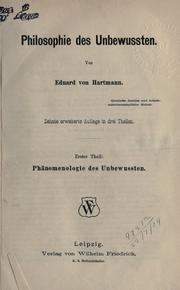|
Philosophy of the Unconscious
Philosophy of the Unconscious: Speculative Results According to the Induction Method of the Physical Sciences (German: Philosophie des Unbewussten) is an 1869 book by the philosopher Eduard von Hartmann.[1] The culmination of the speculations and findings of German Romantic philosophy in the first two-thirds of the 19th century, Philosophy of the Unconscious became famous.[2] By 1882, it had appeared in nine editions.[3] A three-volume English translation appeared in 1884.[4] The English translation is more than 1100 pages long.[5] The work influenced Sigmund Freud's and Carl Jung's theories of the unconscious.[4][6] ReceptionPhilosophy of the Unconscious was translated from German into French and English, and went through many editions in all three languages, exerting a great influence on European culture and helping to make the idea of the unconscious familiar and accepted by the close of the 19th century.[7] The work was widely read.[8] Philosophy of the Unconscious received a critical discussion in the philosopher Franz Brentano's Psychology from an Empirical Standpoint (1874); Brentano commented that Hartmann's definition of consciousness perhaps referred to "something purely imaginary" and certainly did not agree with his definition of consciousness.[9] The philosopher Friedrich Nietzsche described Hartmann's book as a "philosophy of unconscious irony", in his On the Use and Abuse of History for Life, one of the essays included in Untimely Meditations (1876). In Nietzsche's words: "Take a balance and put Hartmann's 'Unconscious' in one of the scales, and his 'World-process' in the other. There are some who believe they weigh equally; for in each scale there is an evil word—and a good joke."[10] Hartmann's work has been seen as preparing the way for Freud's later theory of the unconscious.[4] Freud consulted Philosophy of the Unconscious while writing The Interpretation of Dreams (1899),[6] in which he called Hartmann the firmest opponent of the theory that dreams are wish fulfillments.[11] The philosopher Hans Vaihinger was influenced by Philosophy of the Unconscious, relating in his The Philosophy of 'As if' (1911) how it led him to Schopenhauer.[12] The psychiatrist Henri Ellenberger writes in The Discovery of the Unconscious (1970) that the main interest of Hartmann's work is not its philosophical theories, but its wealth of supporting material.[2] The psychologist Hans Eysenck writes in Decline and Fall of the Freudian Empire (1985) that Hartmann's version of the unconscious is very similar to Freud's.[5] The philosopher Roger Scruton described Philosophy of the Unconscious as the "first major treatise" about the unconscious in Sexual Desire (1986). He credited Hartmann with offering a "canny and vigorous" description of sexual desire, but nevertheless considered him unsuccessful in explaining its intentionality.[13] John Kerr writes that Hartmann's ideas about "destruction and transformation" parallel those of psychoanalyst Sabina Spielrein.[14] The Italian poet Giovanni Pascoli was influenced by Philosophy of the Unconscious in his poetics program, "Il fanciullino" ("The child", 1897).[15] English translationThe first English translation by W. C. Coupland[16] was published in 1884, with the title Philosophy of the Unconscious, a literal translation of the German title. It is currently available as a reprint with the same title.[17] See alsoReferences
External links |
||||||||||||||||||||
Portal di Ensiklopedia Dunia
